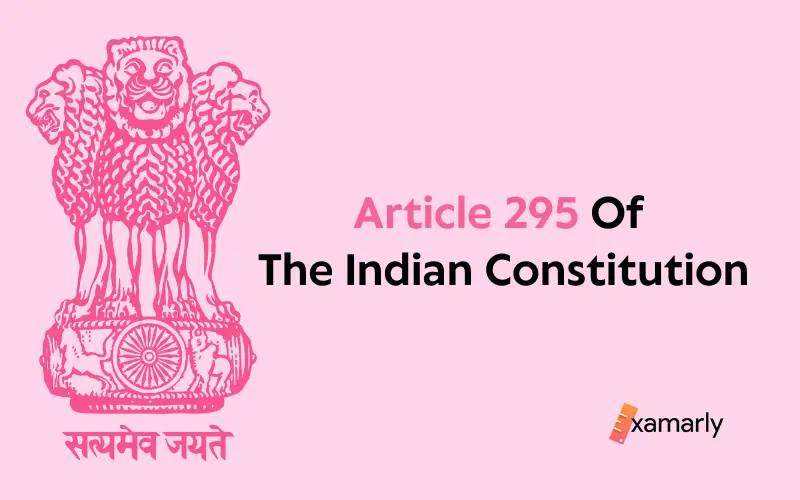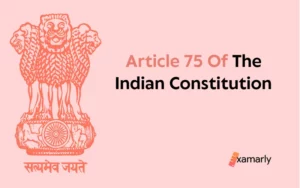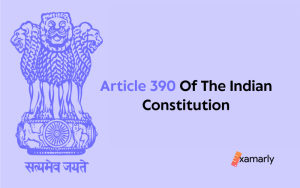Article 295 of the Indian Constitution talks about who gets what property, assets, rights, responsibilities, and obligations from the beginning of this Constitution.
Let’s learn everything we can about Article 295 of the Indian Constitution.
Article 295 Of The Indian Constitution – In Detail
We will look at each and every word and sub-section of Article 295 of the Indian Constitution to ensure that we have a comprehensive understanding of all that is being stated and done.
Clause 1 – As it is & Explained
295. Succession to property, assets, rights, liabilities and obligations in other cases
(1) As from the commencement of this Constitution
(a) all property and assets which immediately before such commencement were vested in any Indian State corresponding to a State specified in Part B of the First Schedule shall vest in the Union, if the purposes for which such property and assets were held immediately before such commencement will thereafter be purposes of the Union relating to any of the matters enumerated in the Union List, and
(b) all rights, liabilities and obligations of the Government of any Indian State corresponding to a State specified in Part B of the First Schedule, whether arising out of any contract or otherwise, shall be the rights, liabilities and obligations of the Government of India, if the purposes for which such rights were acquired or liabilities or obligations were incurred before such commencement will thereafter be purposes of the Government of commencement will thereafter be purposes of the Government of India relating to any of the matters enumerated in the Union List, subject to any agreement entered into in that behalf by the Government of India with the Government of that State
The first clause of Article 295 of the Indian Constitution is further divided into two sub-clauses.
The sub-clauses says that as when the Constitution has been commenced
(a) To the extent that the purposes for which the property or assets were held immediately prior to such commencement will thereafter be purposes of the Union relating to any of the matters enumerated in the Union List, then (a) all property and assets which immediately before such commencement were vested in any Indian State corresponding to a State specified in Part B of the First Schedule shall vest in the Union, and (b) all rights, titles, and interests in and to such property or assets shall vest in the Union.
(b) all rights, liabilities, and obligations, whether arising out of a contract or otherwise, of the Government of any Indian State corresponding to a State specified in Part B of the First Schedule shall be the rights, liabilities, and obligations of the Government of India, if the purposes for which such rights were acquired or liabilities or obligations were incurred prior to such commencement will thereafter be purposes of the Government of India.
Clause 2 – As it is & Explained
(2) Subject as aforesaid, the Government of each State specified in Part B of the First Schedule shall, as from the commencement of this Constitution, be the successor of the Government of the corresponding Indian State as regards all property and assets and all rights, liabilities and obligations, whether arising out of any contract or otherwise, other than those referred to in clause ( 1 )
The governments of the states listed in Part B of the First Schedule shall succeed to the respective Indian governments with respect to all property and assets and all rights, liabilities, and obligations, whether arising out of contract or otherwise, effective as of the commencement of this Constitution, subject to the provisions of Clause 1.
You Might Also Like – Article 293 Of The Indian Constitution
Summing Up
We are able to draw the following conclusion from Article 295 of the Indian Constitution: From the beginning of this Constitution, all property and assets that immediately prior to such beginning were vested in any Indian State corresponding to a State specified in Part B of the First Schedule shall be vested in the Union.
This conclusion can be drawn because Article 295 states that the Union shall take possession of such property and assets. Rights, responsibilities, and duties of the Government of India arising out of any contract or otherwise must be the same as those of the equivalent Indian State. This rule applies whether the contract was made by the Government of India or another party.
FAQs
How does one go about purchasing a home in India?
Steps involved in purchasing real estate in India are as follows:
Locate the property deed and title documents for the property you wish to buy.
Verify that there are no encumbrances or clouds on the property’s title.
Acquire a mortgage or make other financial preparations to complete the transaction.
Put down the money for the booking fee/token advance, and sign the sales contract.
Make the final payment and take possession of the house.
Don’t forget to file the deed of sale with the local sub-registrar.
Can a foreigner purchase real estate in India?
A non-citizen may purchase real estate in India. However, there are caveats and limitations to consider. Persons of Indian Origin (PIOs) and holders of Overseas Citizenship of India (OCIs) have the right to purchase any type of real estate in India, with the exception of agricultural land, farmhouses, and plantation property. Immovable property in India can be purchased by non-citizens other than those listed above with the prior approval of the Reserve Bank of India (RBI).
Is it possible to register joint ownership of property in India?
In India, it is possible to register joint ownership of a property. Both joint tenants and tenants in common are forms of joint ownership. When a property is owned by multiple people as joint tenants, each person owns an equal and undivided share of the property, and the surviving owners take title to the deceased owner’s portion upon that person’s death. When a property is held by tenants in common, each owner has their own individual ownership interest, and upon the death of one owner, that individual’s share passes to their heirs in accordance with their will or the laws of inheritance.
Can an Indian inherit property?
The answer is yes, in India, one can inherit property. Inheritance in India is regulated by the personal laws of the deceased, which are based on their religion. The laws of succession say that a person’s heirs usually have the right to their estate after they die. If they died, their legal heirs would be their spouse, their children, their parents, and their siblings, in that order.






